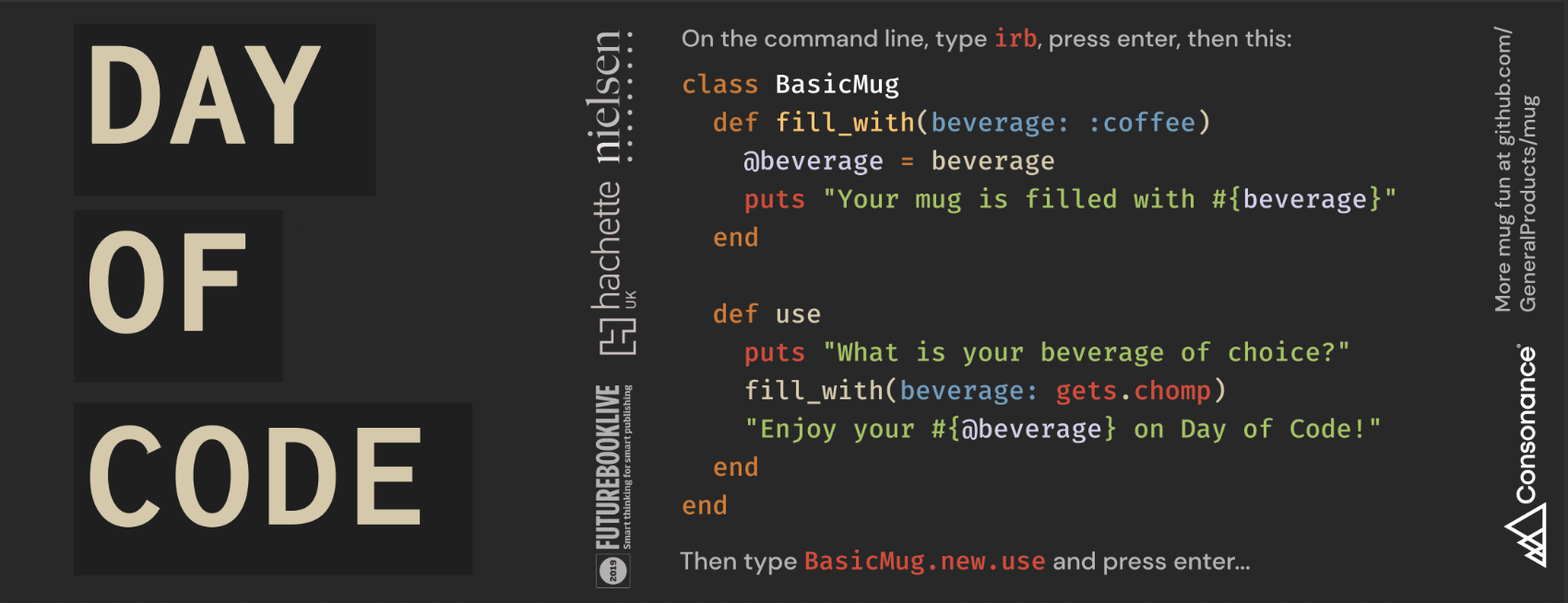16.15 Next steps
Table of contents
- Save your code on GitHub
- Publish your website to the internet
- Use the Learn More boxes for ideas
- Introverts’ route
- Extroverts’ route
- Coding in publishing
- Enjoy your mug
- Feedback
- Stay in touch
- What you’ve learned
This article suggests some next steps for the end of the day or for your ongoing journey after the Day of Code.
Well, you’ve done it! You’ve built a website. Has the bug bitten you? It’s normal at this stage to feel overwhelmed, tired, brain dead and possibly a bit weepy. You’ve had a tantalising, whistle-stop tour of a brand new set of concepts, and you might have a feeling of both elation – you did it! – and also an awareness that there is a lot to learn in programming.
Once you’ve got over today, it would be great to use today as a jumping-off point for your next coding adventure.
Save your code on GitHub
Before the Day of Code, you created an account on GitHub. Follow the instructions here to upload your code to your free account.
Publish your website to the internet
Follow the instructions here to publish your website to a free hosting provider called Netlify. Here’s one we made earlier.
Use the Learn More boxes for ideas
Throughout today you will have seen callout boxes headed “Learn more later” and sections called “Do more later”. It’s a great idea to go back through these docs, at your leisure, and explore those ideas further.
Introverts’ route
If you are an introvert, you’re most likely to enjoy learning over the internet, from books and from videos. We recommend Learn Enough as a great place to get started, followed by Learn Ruby the Hard Way and The Rails Tutorial.
Extroverts’ route
If you prefer learning alongside other people, then Codebar is a great and welcoming event that happens frequently in London, with a new chapter opened in Oxford. Railsgirls is also another good taster day and the Consonance team volunteer there. General Assembly, Makers Academy and Le Wagon run crash courses, but they’re not cheap.
Coding in publishing
How can you start to apply what you’ve learned today? The JSON data that you used today is a good example of structured book data. The same sort of structured approach can be found in ONIX, which is the XML standard that the book trade uses to share metadata. You could explore ONIX XML as well as JSON. You could extend the functionality of the app that you’ve written today to present more of the information accessible from the JSON to improve your website as a selling or reader discovery tool. You could find that you want to learn more about Ruby, and web development frameworks, and write your own dynamic websites.
Whichever way your interests take you, the more knowledge you accrue, the more power you have. Any step towards demystifying code gives you power in third party relationships, on any digital project. You might find that the bug really bites you and that you want to delve deeper into programming – but any technical knowledge improves your position. You don’t need to be a professional programmer, but programming knowledge will make you a wiser project manager, editor, marketer, designer and reader advocate. You will know what’s possible.
Enjoy your mug
You got a mug at the Day of Code featuring this artwork:

There’s more code to extend the functionality of your mug on GitHub. Intrigued? Go and have a look, and see if you can glug your beverage of choice from your mug, programmatically!
Feedback
Please kindly give us feedback so we can run an even better Day of Code in 2020!
Stay in touch
Do stay in touch with us! Here’s our company website with links to all the initiatives we do to increase technical literacy in publishing. We blog at www.consonance.app, and tweet at @consonance_app: our staff are Emma @has_many_books, Andy @andypearson, Sara @saramoohead and Dave @databasesponge. Please follow our Publishers’ Advice Bot.
And if you need a modern, cloud-based publishing management system, you know where to come! Visit Consonance.app to find out what we do.
What you’ve learned
- This is only the beginning!
- But you made a website in a day, so well done you.